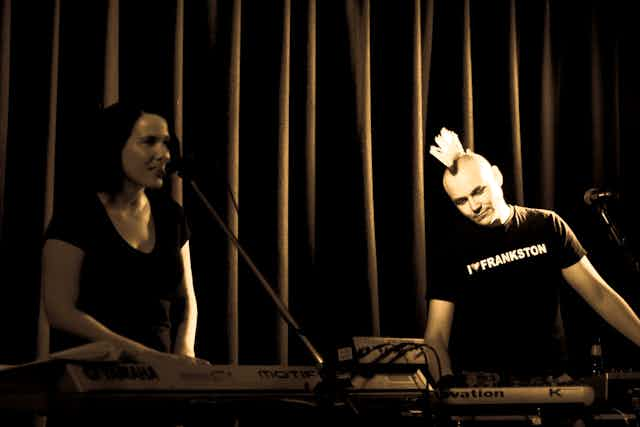Electronic dance music (EDM) is an increasingly popular music genre. Electronic music can be defined as a sound dominated by electronic instruments and digitally generated sounds and also by digital samples of vocals and conventional instruments.
Despite the emergence of new communication technologies for music production and dissemination, it is still essential for EDM artists to be part of a local music scene.
Emerging artists typically depend heavily on the contacts and resources that they can find in their local city. The nature and scale of the truly global music industry appear not to have changed this relationship between EDM artists and their local music scene.
And the global electronic music industry is big. According to the latest IMS business report, the industry’s annual value has reached US$7.4 billion. NME reports that the three wealthiest DJs are Tiesto (Netherlands), Daft Punk (France) and Paul Okenfoald (England).
DJ Tiesto is asking for US$250,000 per DJ set. Daft Punk, the duo who pioneered French house in the 1990s, are worth US$120 million in licensing deals, royalties, music sales and merchandise. Their value increased after the success of their fourth album, Random Memories, which has sold more than 3.2 million copies worldwide.
EDM artists, unlike the most famous DJs, belong to local alternative scenes as is the case in Brisbane. Those scenes can be labelled as underground. According to the semi-structured interviews performed for my research, the electronic scene in Brisbane started as a DIY alternative scene.
In Brisbane, the rock and punk scenes have been documented in books like Pig City. In contrast, the electronic scene in Brisbane is rather unknown, yet it gathered more than 200 artists between 1979 and 2014. This has been documented in BNE: The Definitive Archive, released by Dennis Bremmer, founder of independent music label Trans:Com.
If music is global, why does local still matter?
Emerging artists need to engage with the technology and to have access to mentoring and technical advice. It’s a point made by Heidi Mellington, who joined the scene in the early 2000s:
Being in a city gives you access to mentors that have been trained and know how to use the latest sofwares.
She was part of Lady Electronica, a collective of female artists, and of darkwave electronica duo Dizzygotheca with Anthony Smith (2005-2010).
Most musicians interviewed for my research were interested in creating experimental edgy music. The aim was not necessarily to become successful, but to remain underground.
Brisbane’s electronic sound can be labelled as “electronic fusion”. It’s a blend of hip-hop, funk, drum and bass and sometimes goth music, according to Porl Deville, who was part of successful acts such as My Ninja Lover, who opened for Ben Harper, Jamiroquai and Moby in the mid-1990s.
Local radio stations such 4ZZZ or Triple J helped artists to have their electronic dance music tracks played. In Brisbane, venues like The Zoo, Ric’s Cafe Bar and The Lofly Hangar – a meeting place for the independent music community; it no longer exists – welcomed EDM artists.
These artists still need to be engaged in the economic and social networks that are found in metropolitan areas. This helps them to access technical advice, mentoring and grants (to fund music videos).
Even if Facebook and Soundcloud are fantastic tools for self-promotion, location is important. It remains an asset for a young EDM artist to be located in a city. It’s there that they have access to the best equipment and can learn about software tricks and production, mixing and mastering tips from experienced mentors.

